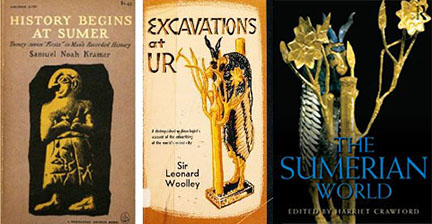
One of my favorite books of all time is Samuel Noah Kramer’s History Begins at Sumer. In my youth I was fascinated with the Sumerians. I have a paperback copy of C. Leonard Wooley’s The Sumerians, published by Norton in 1965 and also his Excavations at Ur, an Apollo Edition also from 1965. The first Woolley book set me back $1.75 back then and the second was a whopping $1.95. All three cost me less than a five-dollar bill. A few days ago I received an email from Routledge announcing a new book called The Sumerian World spread out in some 688 pages. Pagewise this is about the same as all three of the books mentioned above. It looks like a fine book and I only wish I was a millionaire so I could afford it. The price for this new tome is $220 for the hardback (the e-book is not yet announced).
I do understand the nature of inflation, but going from $5 to $220 in a little less than five decades strikes me as over the top for printed books. If I asked my librarian to order this book, I suspect the laughter would continue for at least several minutes. I am not sure how many millionaires out there have a profound interest in the Sumerians, but surely the price is no object for any of them. But somewhere there may be a 14-year old kid, like me in 1965, with a developing interest in the Sumerians or some other ancient people. I suspect he or she will have to stick with Kramer and Woolley and that is a shame. Brilliant and useful as those books are, we do know more about the Sumerians now than when these books were written (which was before 1965 in fact). But here is some good news: Wooley’s original 1929 Ur of the Chaldees is available free online at archive.org, as is a copy online of Kramer’s book.
But let’s allow Sir Woolley the last word, indeed the last words of his The Sumerians:
The military conquests of the Sumerians, the art and crafts which they raised to so high a level, their social organization, and their conceptions of morality, even of religion, are not an isolated phenomenon, an archaeological curiosity; it is as part of our own substance that they claim our study, and in so far as they win our admiration we praise our spiritual forebears.